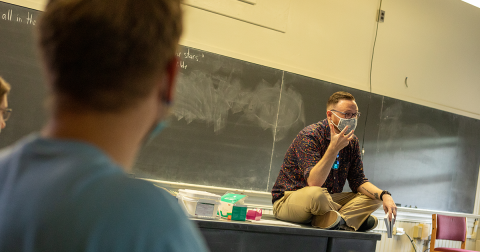
“How race and disability are considered in our contemporary understanding is constructed in British literature all the way back to Beowulf and going all the way up to Shakespeare,” explains Professor Nic Helms, an English faculty member intrigued by the origins of today’s social concerns. He eagerly shares his findings with students and colleagues, taking full advantage of Plymouth State’s pedagogical flexibility.
Helms’s 2019 book, Cognition, Mind Reading and Shakespeare’s Character, combines some of his wide-ranging interests. “It looks at contemporary philosophy and neuroscience conversations about how we puzzle out what goes on in other peoples’ heads,” says the author. “That’s the kind of stuff that really gets me excited. Taking cognitive science broadly, we can ask how a Shakespearean scene may look different now that we know more about how the mind works.”
Helms served as the neurodiversity consultant for the recent Silver Center production of the Curious Incident of the Dog in the Night-Time, whose protagonist is an autistic teenager, and he hopes to find time in his busy life to get more involved with theatre. “As we are fighting to scrabble our way back to a face-to-face experience, live performance can be really powerful for adding to the experience of literature and telling other peoples’ stories,” he says.
“We can take the frame of a literature course and go off that beaten path in favor of reading and talking about text that often tells a different, more diverse story. It’s better for students, better for faculty, better for staff, and better for the surrounding community.”
Professor Nic Helms
Now in his second year, Helms has established himself as an energetic and creative force on campus. He’s editing the English program’s departmental newsletter and recently shepherded a timely Sidore Lecture Series presentation by Dr. Travis Chi Wing Lau that traced today’s antivaccination fervor to centuries-old debates.
Helms’s courses include Composition: Writing about Disability, Currents in Global Literature, and a pair of “rethinking” courses: Rethinking Medieval and Renaissance Literature and Rethinking Modern British Literature, 1660–1945, which he maintains are emblematic of an admirable, one might say radical pedagogy.
“What we talk about with the rethinking courses at PSU is, rather than doing the same old things that have been done for decades and decades, we’re more interested in what can make for great conversations about literature and culture,” says Helms. “We can take the frame of a literature course and go off that beaten path in favor of reading and talking about text that often tells a different, more diverse story. It’s better for students, better for faculty, better for staff, and better for the surrounding community.”
Helms is a big proponent of the Cluster Learning Model and the CoLab, the University’s dynamic hub for teaching and learning praxis and community-driven academic professional development. “I loved the idea of Clusters when I was interviewing here, and I started going to CoLab events even before I started working at PSU,” he says. The pandemic furthered his appreciation. “I can’t imagine what I would’ve done if I hadn’t had the CoLab community. The work they’re doing in regard to flexible teaching is so important.”
While earning his master’s and PhD in English at the University of Alabama, Helms also acted as artistic director of Tuscaloosa’s Improbable Fictions staged reading series for over a decade. His talent for presenting engaging programs has found a new home at PSU in the form of Intersectionality Talks. Co-sponsored by the English program and the CoLab, the new, free, digital speaker series features intersectional talks on literature and culture that are structured around questions collected from PSU students and the University’s broader academic community.
A Dixie transplant, Helms has been quick to sniff out good local barbecue—“that vinegar-based sauce is where it’s at for me”—and has high praise for New England seafood. He’s had no difficulty adjusting to the Yankee persona, which is sometimes viewed by those from away as dour and distant. “If people are a bit more blunt here, that’s fine, I can relate and sometimes feel that way as well!” he says, charitably. Stereotypes aside, both he and his wife, Interim Archives and Special Collections Librarian Alissa Helms, have found Plymouth to be collegial and “incredibly supportive.”
Whether it’s imagining a Plymouth-style version of the Improbable Fictions staged reading series, contemplating a potential new minor in disability studies, or digging deeper into regional cuisine, Helms is nothing if not motivated to keep exploring the opportunities presented by the Plymouth State community.

